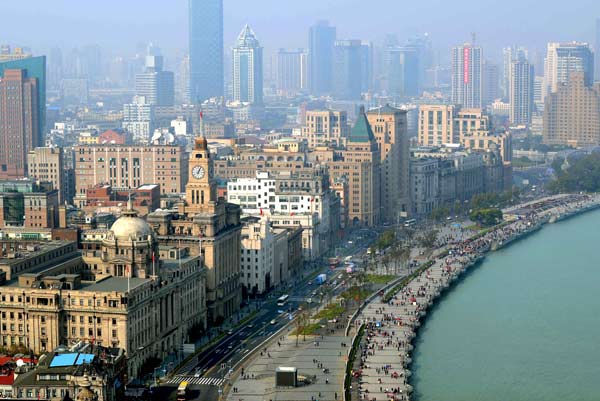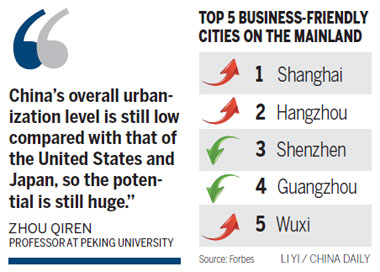Shanghai reclaims top spot
Updated: 2012-12-13 09:18
By Wei Tian in Beijing and Feng Zhiwei in Changsha (China Daily)
|
||||||||
Forbes magazine names city as China's 'best for business' among 100 competitors
Shanghai has reclaimed the title "Best City for Business" after three years, a Forbes magazine ranking showed on Wednesday.
The city's improved position comes as the competitiveness of export-oriented cities in South China declines amid the sluggish global recovery.
|
 |
|
The Bund in Shanghai. The metropolis regained its first place ranking on the list of best cities for business on the Chinese mainland, as the rankings for export-oriented cities such as Guangzhou and Shenzhen dropped, Forbes Magazine said on Wednesday. Wang Song / Xinhua |
The survey, which was the ninth of its kind, ranked 100 cities, evaluating eight factors that could affect business strength, such as labor, transport, costs, innovation and the size of private economy.
Guangzhou and Shenzhen, which ranked first and second last year, gave up their leading positions to East China's Shanghai and Hangzhou, reflecting the fact that Guangdong province has been hit hard by the country's deteriorating foreign trade situation.
Wuxi, in East China's Jiangsu province, took fifth position as the city improved its traffic system and capacity for innovation, Forbes said in its report.
But coastal provincial cities are seeing their rankings fall as part of an overall trend due to surging operational costs and the slow speed of growth in developed areas, together with a larger exposure to global turmoil.

On the list termed "cities with the highest operational costs", eight out of the top 10 most expensive cities are from coastal provinces, led by Beijing, Shanghai and Tianjin.
In comparison, cities in Central China are climbing up the rankings as a result of adequate labor resources, lower operational costs and improving transport systems.
Zhou Jiangong, editor-in-chief of Forbes' Chinese edition, said this year's table was a reflection of China's economic transformation and industrial transfer.
"The central regions are where people, resources, labor and talents gather, so they are a logistical hub," he said, adding that cities in central regions may overtake first-tier cities as the fastest-growing regions.
The Yangtze River Delta still dominates the list, having 31 cities selected, while the Pearl River Delta has 11 cities on the list.
Jiangsu province has the largest number of cities in the rankings, with 18, followed by Shandong province with 13 and Zhejiang province with 12.
According to a Forbes survey, Suzhou was the most innovative city, overtaking Shenzhen for the first time, because of a significant increase in the number of patent applications and licenses there.
Western cities such as Lanzhou, capital city of Gansu province, and Urumqi, capital city of the Xinjiang Uygur autonomous region, made their debuts on the list. However, their levels of consumption and innovation were far lower compared with cities in central regions, the report said.
"China's overall urbanization level is still low compared with that of the United States and Japan, so the potential is still huge," said Zhou Qiren, a professor at Peking University.
However, he said, the role of government in advancing urbanization should be weakened, as this has led to the misallocation of resources, as in the case of projects that are not in line with population movements.
Zhou also said China should reconsider its urban development strategy, which mainly concentrates on developing smaller cities, and shift to developing larger cities.
Contact the writers at weitian@chinadaily.com.cn and fengzhiwei@chinadaily.com.cn
Special Coverage
Feeling the Pulse of China's Economy
Related Stories
Shanghai gains in competitiveness list
Shanghai seeks to be world commodities trade center
Shanghai eyes gold exchange-traded funds
Shanghai hosts most multinational HQs
Shanghai’s exports affected by eurozone debt crisis
- Shanghai gains in competitiveness list
- Shanghai reveals green open spaces plan
- Shanghai gives green light to duty-free store
- Shanghai seeks to be world commodities trade center
- Shanghai eyes gold exchange-traded funds
- Shanghai hosts most multinational HQs
- Shanghai’s exports affected by eurozone debt crisis

 Relief reaches isolated village
Relief reaches isolated village
 Rainfall poses new threats to quake-hit region
Rainfall poses new threats to quake-hit region
 Funerals begin for Boston bombing victims
Funerals begin for Boston bombing victims
 Quake takeaway from China's Air Force
Quake takeaway from China's Air Force
 Obama celebrates young inventors at science fair
Obama celebrates young inventors at science fair
 Earth Day marked around the world
Earth Day marked around the world
 Volunteer team helping students find sense of normalcy
Volunteer team helping students find sense of normalcy
 Ethnic groups quick to join rescue efforts
Ethnic groups quick to join rescue efforts
Most Viewed
Editor's Picks

|

|

|

|

|

|
Today's Top News
Health new priority for quake zone
Xi meets US top military officer
Japan's boats driven out of Diaoyu
China mulls online shopping legislation
Bird flu death toll rises to 22
Putin appoints new ambassador to China
Japanese ships blocked from Diaoyu Islands
Inspired by Guan, more Chinese pick up golf
US Weekly

|

|







